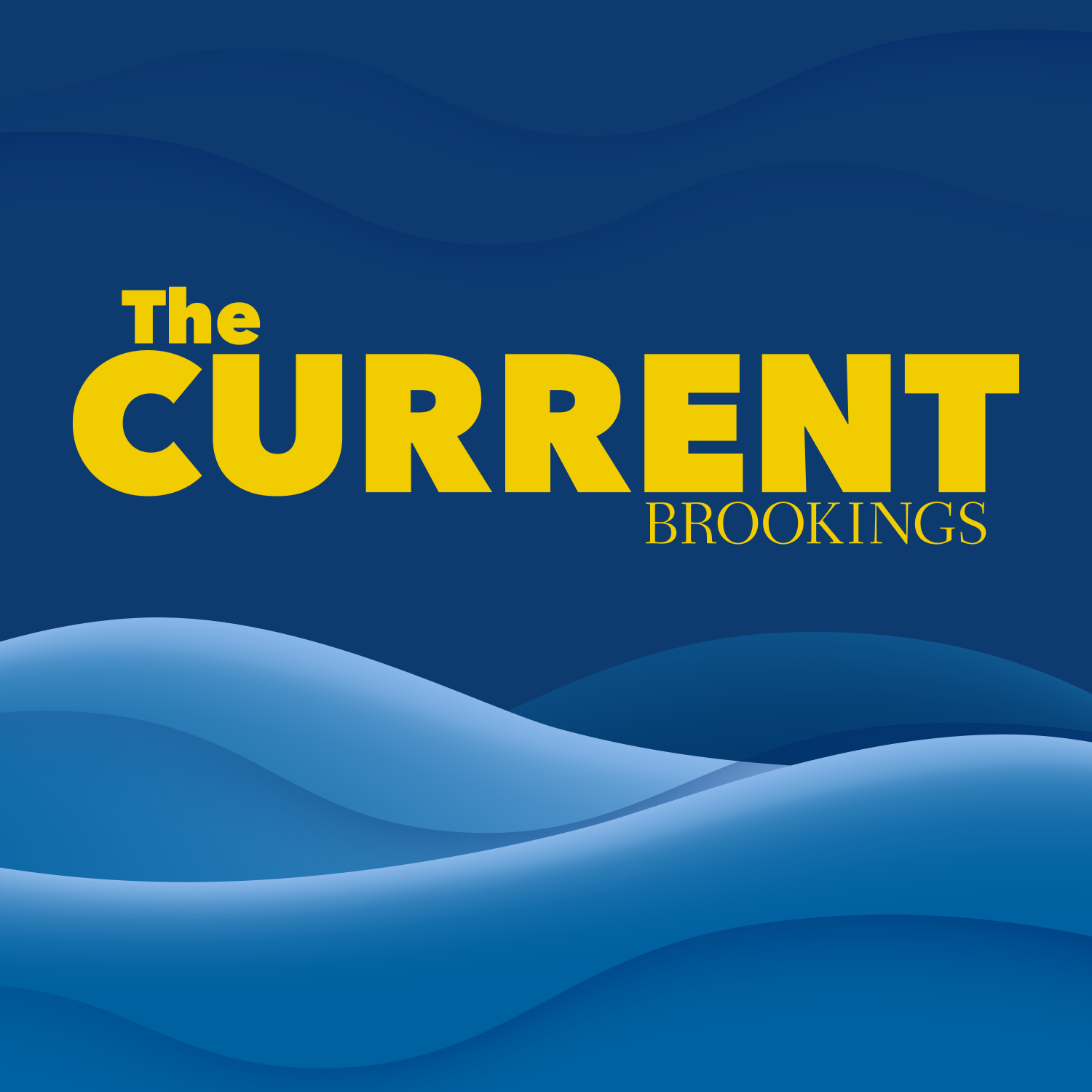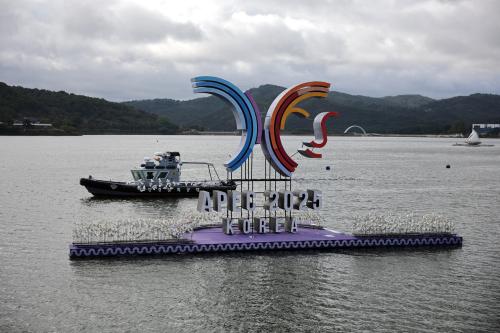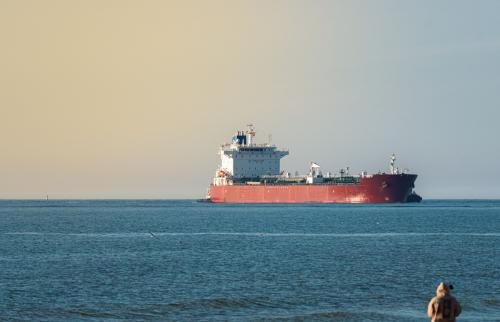The annual summit of the Asia-Pacific Economic Cooperation Forum, or APEC, starts October 31 in South Korea. Leaders from the twenty-one Pacific Rim economies are expected to attend. In this episode of The Current, two Brookings senior fellows talk about the aims of the summit and what’s at stake for the U.S. and other participants. Ryan Hass directs the John L. Thornton China Center and Mireya Solís directs the Center for Asia Policy Studies.
Transcript
HASS: This is the natural venue for the U.S. leader to articulate a vision and a sort of statement of purpose of American leadership in the most crucial region of the world for America’s economic growth in the 21st-century.
And to the extent that the United States seizes that opportunity, it it puts itself in a very advantageous position. To the extent that it misses that opportunity, it creates a huge opening and vacuum for others to step in and fill.
[music]
DEWS: Hi, I’m Fred Dews, and you’re listening to The Current, part of the Brookings Podcast Network.
The annual meeting of the Asia Pacific Economic Cooperation Forum, or APEC, kicks off October 31st in Seoul, South Korea. The leaders of the twenty-one Pacific Rim nations are expected to attend. With me now to talk about the aims of the conference and what’s at stake for the United States and other countries are two Brookings senior fellows. Ryan Hass directs the John L. Thornton China Center at Brookings and Mireya Solís directs the Center for Asia Policy Studies at Brookings.
Ryan, welcome to The Current.
HASS: Thank you very much.
DEWS: And Mireya, welcome back to The Current.
SOLÍS: It’s a pleasure to be here.
DEWS: So what is APEC’s role in the Pacific region’s economic ecosystem? Maybe a question for you both. And why does the U.S. prioritize this meeting?
[1:10]
HASS: Well, APEC traditionally has been a venue to harmonize regulations to permit more cross border flows of goods, services, investment. And that has been the traditional function of the organization. As the United States becomes a little less enamored with some of those issues, it really has become a vehicle, an action forcing event to allow leaders to come together and see each other and have bilateral meetings on the margins.
[1:35]
SOLÍS: I I very much agree with that. And let me just elaborate a little bit on what I think are the core missions of APEC and also to touch on a little bit of its evolution over time. Because it’s certainly an a platform that has changed. But the central mandates remain, right? That is to promote regional economic integration and to be a conduit for high level diplomacy. And when APEC was established, the idea was, you know, very uniquely to promote open regionalism. So it was a rejection of, say, a Fortress Asia, Fortress America. The idea is that you try to knit together these twenty-one economies in the Pacific Rim.
Now people, economies have different views on what should be the driver and the form of that integration. And APEC, therefore, also has seen some, you know, heated battles as to who’s going to provide leadership, who’s going to provide the vision for integration.
This is going to make a little bit of ancient history, if you will, but there was a time when it was not just a U.S.-China vying for leadership, but where Japan and the United States actually had quite different views on the nature of economic integration. The United States at that time, still a very strong champion of trade liberalization, rule that bind Japan, saying, no, let’s make this a soft cooperation agreement. And of course it’s interesting to note that it was the latter view, the soft cooperation approach, that prevailed.
Another very important role of APEC on the economic integration front is that really it is the docking mechanism for the most important regional trade agreements in the region. So you have the Regional Comprehensive Economic Partnership, or RCEP. And you have the CPTPP.
And the idea is, you know, the end goal would be to have free trade area for the twenty-one economies. That certainly the geopolitics do not allow for that, but those mega trade agreements are already in place. And interestingly, the United States is not part of that.
Lastly, I would say in terms of its economic mission, APEC has been successful as a laboratory. So it has actually come up with new approaches to trade liberalization that are later incorporated by the WTO. And where it would really had an important impact was with information technology agreement, which basically brought free trade to electronics, to consumer products. And we’re all benefiting from that boom to economic exchange.
You also asked what are the goals of the U.S. as part of APEC? One is to show that the United States is a Pacific power that is going to have a say in the regional architecture, and also to make sure that China doesn’t steal the show, and to advance bilateral and regional diplomacy. Because as Ryan was saying, APEC also has become the way in which you have all these Asian leaders, from not only Asia, but also from Pacific Rim economies come, and some ways to think about it is as a prom of diplomacy. Everybody shows up.
[4:25]
HASS: You know, Mireya put her finger on something that’s really important, Fred, and I just want to dwell on for a second, which is that America’s views around economic integration have waxed and waned over time. But that doesn’t mean that the project of economic integration depends upon the United States solely. And there are a lot of countries in the region that are very committed to and see a lot of benefit and value from deepening the economic integration process and see APEC as a vehicle for doing so.
DEWS: APEC 2025 coincides with deepening tensions between China and the United States largely over trade, but perhaps other issues. So given that context, what are the stakes for the U.S. and global stability at this point at APEC 2025?
[5:04]
SOLÍS: Well, you know, I think that the stakes are high, the whole region is reeling because if you think about it, the way in which the great powers have operated, certainly in the course of the year is by taking actions, thinking about their strategic rivalry and the geo-economic tools. And by doing so, they have called into question, I think, the essence of what the APEC project is all about. You think about how President Trump has started his second term. And it has been really with an unprecedented escalation of tariffs in a way that actually some of the economies that have been the target of the highest level of duties have been Southeast Asian economies.
So everybody’s trying to understand what this shift to bilateral trade negotiations, to having to deflect the pressure from tariffs, what does that mean?
At the same time, you have a China who talks, you know, the talk of globalization, but doesn’t really open its own market in a fair way and is responding to the Trump trade offensive by redirecting its exports. So actually you have a lot of data showing that there’s stress in many of these other economies because they’re now receiving a lot of the Chinese goods.
So the overcapacity problems that China’s generating, the fact that China just shook everybody with the adoption of export control rules that, you know, all of these actions, the tariffs, the export control rules, the overcapacity issues, they talk about the risks of economic interdependence.
And the question is whether APEC has a solution. In the agenda of APEC, I think they’re going to pick up some important themes: demographic change, AI, connectivity. But I don’t think we have a clear solution what we do when the big powers decide that economic interdependence is a tool of a strategic rivalry.
DEWS: So are President Trump and President Xi Jinping of China expected to meet at APEC?
[7:02]
HASS: Well, Fred, it’s interesting to watch this saga unfold because expectations about this meeting have varied considerably. At one point, earlier in October, we were talking about the possibility of massive deals emanating from a meeting between President Xi and President Trump. Bloomberg reported on a trillion dollars of Chinese investment that could be unlocked through this meeting. President Trump has talked about China buying massive amounts of soybeans from U.S. farmers and on and on and on.
And then after China announced export control restrictions on rare earths, President Trump declared that maybe there’s nothing to talk about, no need for him to meet with President Xi. And so for a a 24-hour window of time, the meeting was off. Now, as of today, it’s back on. But ultimately, I I do expect that the two leaders will meet because it serves both of the leaders interest to do so.
DEWS: And I should add that today is October 21st, Tuesday. So we we’re, we’re a week before the meeting starts.
SOLÍS: We have to date everything because things change very quickly.
DEWS: Absolutely. We’ve talked a lot about China, but what’s at stake for the U.S. in terms of some of the other countries like Japan, Australia, the ASEAN countries?
[8:04]
SOLÍS: Well, before President Trump heads to APEC, he’s going to make a stop in Japan. And that clearly signals that the relation with Japan is very, very important to U.S.-Asia strategy. So I’m going to talk a little bit about what we expect Japan and the United States will discuss, what is at stake in that meeting.
But, you know, it’s interesting to me, and I do want to start by making the point that the whole approach of the Trump administration seems to be to emphasize the bilaterals, whether it’s on the sidelines of APEC, or it’s by making a dedicated stop in Japan as opposed to emphasize as much the APEC Leaders’ Summit. We don’t know exactly what the president’s calendar is going to be, but the expectation is that he may actually go to Korea, and skip the APEC Leaders’ Summit, that he’ll have bilateral meetings, that he’ll go to the CEO Summit. And I think that’s very on brand for President Trump, that he’s interested in, you know, that exchange with some leaders and to emphasize, you know, economic opportunities for American firms.
Now in terms of some issues that he may be, pursuing with some of the APEC members, as I said before, clearly with Japan, you know, there’s a, a, a trade deal that has been now negotiated with a really large investment fund that the Japanese government is going to make available of $550 billion. And those investment projects are supposed to take place in the United States to advance economic security. But we don’t have a clue as to how that investment fund is going to be implemented, operationalized. There’s still very important, issues to be worked out, how the projects will be identified, how different private companies may operate, may may join, may dock into these projects. And the extent to which these will be loans or equity investments.
So I think that from the point of view of the United States vis-à-vis Japan, they want to send a reassurance signal that the alliance is critical. They want to then probably ask the host what’s happening with the investment fund. How are we actually going to get ongoing? And of course, Japan just got a new prime minister, the first time a female leader is, you know, going to be taking all these responsibilities.
And this will be a a time for the leaders to meet to see if they can develop chemistry, if they can develop a good rapport. We traditionally, in U.S.-Japan relations, we always take note of that because periods where the U.S.-Japan alliance has made very significant strides tend to coincide also when the two leaders are aligned. And, you know, so so that’s something that I think is very important to watch on the Japan stop.
Vis-à-vis other APEC economies, you know, again, I think President Trump is taking care of business bilaterally. Just yesterday, I think, that he had an understanding with Australia about a critical minerals deal. So that’s also an important item that he has taken off the list ahead of APEC.
And, you know, with ASEAN as I mentioned, the fact that ASEAN countries have been the target of all these very high level of tariffs, I’m sure that there’s going to be follow ups to see if there can be some flexibility and what kind of business deals could be found.
[11:23]
HASS: Fred, can I just throw three ideas on top of the brilliant overview that Mireya provided? The the first is that President Trump’s foreign policy and MAGA principles for foreign policy, Make America Great Again principles for foreign policy, don’t overlap very well with APEC.
Insofar as there are principles, I think the first would be a real disdain for multilateralism and globalism, which is embodied in APEC.
The second would be a real focus on economic nationalism, the idea that each country is in charge of its own economy and we must protect and defend our our economies.
And then the third would be a real sort of conviction around upholding sovereignty and avoiding external problems from spilling into the the country itself. You could potentially add a fourth on on sort of civilizational issues and ethno, ethnonationalism. But we’ll just set that aside for the time being.
The point is that that these principles just don’t overlap neatly with APEC. But what that says is that, yes, President Trump may not be deeply engaged in the minutia of APEC or sitting in the leaders’ meeting to listen to plenary, interventions by other leaders.
But that absence could create opportunity for other leaders to exercise leadership and really sort of drive an agenda around where where the institution and regional economic integration will go going forward.
And that’s brings me to the final thought, which is that, as Mireya pointed out, China’s exports to the United States have gone down. Their exports to the rest of the world have gone up, and particularly in Southeast Asia. And so it’ll be sort of an interesting case study to watch about whether these countries who all come together and sit around a table together will be able to find some commonality of purpose for dealing with this sort of surge and wave of of Chinese exports that have flooded their markets.
DEWS: We’ve talked a lot about what’s at stake for the major economies, the United States, of course, China, Japan. But what about some of the smaller economies in APEC? I’m thinking Chile or Vietnam. What’s at stake for those countries at APEC 2025?
[13:22]
SOLÍS: Well, you’re talking, you know, in those examples about open economies and smaller economies, if you will, that, you know, the APEC Summit is a very important opportunity to have these high level interactions. But they also they care deeply about the openness agenda, because they’re in the receiving end of a lot of these adverse trends.
So I think what they probably would like to see is a regional summit that is not hijacked by the bilaterals, and it’s not hijacked by issues that are not front and center to how we actually move forward in this new environment, how we think about development challenges, how we think about supply chain resilience.
I think that the Korean theme of AI connectivity it’s probably also of great interest because we’re all trying to grapple with the consequences of this technological revolution.
APEC started with a, you know, roll your sleeves and think creatively about economic integration. Then it improved its visibility highly with the Leaders’ Summit. But now we run the risk that those opportunities for diplomacy may be, you know, prioritized, especially the bilateral engagements. And I think that for economies like Vietnam and Chile, they still don’t want to, you know, give up what really remains the reason why APEC was established and that gives them an opportunity to be front and center in defining rules, architectures, docking mechanisms to try to make sure that the engines of international growth do not stumble.
[15:05]
HASS: One issue that I’ll be watching is Taiwan. Taiwan is a member of APEC. Traditionally the Taiwan representative has an opportunity to interact with the U.S. delegation at APEC. And then next year China will be the host of APEC. And so it’ll be interesting to watch to what extent Taiwan representatives have opportunities to interact with their Trump administration counterparts and also whether any understandings are arrived at around Taiwan’s participation in APEC next year in China.
DEWS: Final question for you both. What’s ultimately at stake for the United States in APEC generally speaking, no matter who the president is?
[15:48]
SOLÍS: I think to be a driver of regional growth and diplomacy. I think we are really, you know, at the risk of being marginalized by refusing to speak the language of the region. We have to understand that this region that has thrived by embracing, you know, global supply chains by embracing rules that give predictability. The United States more and more seems to be operating with a different set of goals and intentions.
So, you know, I always say that showing up is everything. And, you know, a traditional test of U.S. commitment to the region has been, you know, attendance at these regional summits. And the fact that President Trump may not attend the APEC Leaders’ Summit, I think it’s not going to surprise anyone. It’s going to confirm what we all understand are his primary objectives or way to understand international diplomacy. But it does create further distance from how the United States is operating and where the region is. And a time when China is doing things that, you know, complicate the lives of many of these, economies, but shows up, talks the talk. The question is whether it walks the walk.
[17:08]
HASS: Fred, if you look at the diplomatic calendar every year, there are two events that focus the U.S. leader on Asia. The first is the ASEAN related meetings. The second is APEC. This is the natural venue for the U.S. leader to articulate a vision and a sort of statement of purpose of American leadership in the most crucial region of the world for America’s economic growth in the 21st century.
And to the extent that the United States seizes that opportunity, it it puts itself in a very advantageous position. To the extent that it misses that opportunity, it creates a huge opening and vacuum for others to step in and and and fill.
And so that’s at at a macro level, that’s what I think we should be watching as we handicap President Trump’s involvement in APEC over the coming period.
DEWS: Okay. Well we will certainly be watching it and we’re looking forward to what you, Ryan and Mireya, you have to say and other Brookings scholars have to say about APEC 2025. Thanks Ryan, thanks Mireya, for sharing your time and expertise with us today.
HASS: Thanks for the opportunity, Fred.
SOLÍS: Thank you.
[music]
DEWS: You can learn more about Ryan Haass and Mireya Solis and their research on our website, Brookings dot edu.
More information:
- Listen to The Current on Apple, Spotify, YouTube, or wherever you like to get podcasts.
- Learn about other Brookings podcasts from the Brookings Podcast Network.
- Sign up for the podcasts newsletter for occasional updates on featured episodes and new shows.
- Send feedback email to [email protected].
The Brookings Institution is committed to quality, independence, and impact.
We are supported by a diverse array of funders. In line with our values and policies, each Brookings publication represents the sole views of its author(s).






Commentary
PodcastAPEC 2025: What’s at stake?
Listen on
The Current Podcast
October 23, 2025